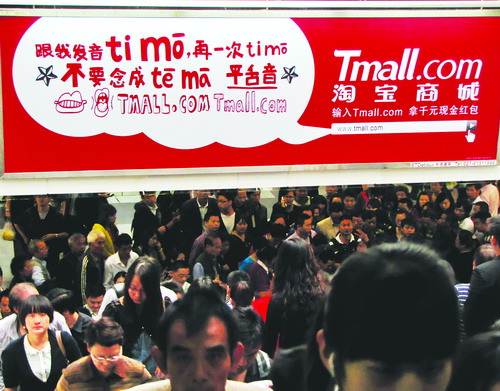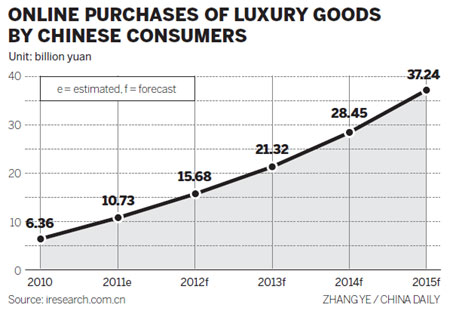 |
|
|
|
|||||||||||
|
 A tmall.com billboard banner hanging above an aisle at a subway station in Shanghai. Promoting their images through heavy investment in advertising is only part of the effort online retailers make in order to attract luxury brands and lure more Chinese shoppers. [Photo / for China Daily] |
Internet trading had revenues of nearly 800 billion yuan in 2011: iResearch
Following the end of a one-month online trial, the New York-based fashion house Coach is expected to start its own e-commerce operations in China.
Some say the move could trigger a new wave of Internet luxury goods retailers catering to the rising demand from affluent Chinese consumers.
Coach launched its first official online store in China on Taobao Mall (Tmall) with products including limited edition bags and accessories in December.
The 30-day initiative - part of a marketing campaign to mark the company's 70th anniversary - was well received by online shoppers, said Yan Qiao, public relations manager of Tmall, a business-to-customer shopping website under the Alibaba Group.
Coach said the online store achieved around 3.5 million hits during the period.
"Through direct contact with Chinese online consumers, we have increased our understanding of the needs and preferences of China's online shoppers and accumulated valuable experience in China's e-commerce landscape and gained insights to potentially pave the way for the development and launch of a permanent online Coach store in China," said Jonathan Seliger, president and chief executive officer of Coach China.
The brand had 65 stores across 28 cities on the Chinese mainland by the end of December.
"The e-commerce business planned for the future will bring more convenience and options for customers as it will allow them to decide which channel - offline store or online platform - to visit and make purchases," said Victor Luis, president of Coach Retail International.
"We plan to launch an e-commerce business in China within the next 12 to 18 months."
Online retailers are eager to work with luxury brands to lure more high-end shoppers.
"Both sides are satisfied with the result of the trial run," said Yan of Tmall. "We believe cooperation with luxury brands will grow closer."

He added the online shopping mall is in talks with many top-end international luxury brands at present.
"Our biggest gain from working with luxury brands such as Coach is to enable companies like them to understand online channels," said Yan.
He predicts that sooner or later shopping for luxury products online will become a trend. Italian luxury brand Gucci also hopes to keep its products relevant for new generations of customers after it launched 14 e-commerce sites including ones in South Korea and Japan,
"We do not have an e-commerce operation in China at this moment but we are planning to," said a Gucci spokesman. "The company continues to invest significantly in the digital area."
According to iResearch, a consulting group based in Beijing, online trade has continued its momentum of growth with revenues of nearly 800 billion yuan ($127 billion) in 2011, a rise of 67.8 percent year-on-year.
The Chinese frenzy for purchasing luxury products is luring an increasing number of high-end brands to cash in on the online market in the country.
Wealthy Chinese bought more than 100 billion yuan of luxury goods in the mainland market last year, a year-on-year increase of at least 25 percent, management consultants Bain & Co said in its latest report on the 2011 Chinese high-end market.
The online trade of luxury goods was expected to have reached 10.7 billion yuan in 2011, a growth of 68.8 percent annually, according to iResearch's report, 2011 China Luxury Goods Online Shopping Industry. The figure will reach 37.2 billion yuan by 2015, the report said, largely because of the introduction of more luxury brands and more varieties and the demand from second- and third-tier cities.
At present luxury shopping websites - including customer-to-customer and business-to-business websites - exist with Internet retailers such as Taobao.com or 360buy.com and on dedicated luxury-product shopping websites such as Shangpin.com.
IResearch's report said websites selling luxury goods continue to diversify and second- and third-tier brands will grow, offering customers a wider range of choices.
Ding Jiaqi, an analyst with iResearch, said: "There are emerging luxury fashion brands wanting to reach more customers through online platforms. But the top-end retailers still have doubts about going online in China."
wangzhuoqiong@chinadaily.com.cn